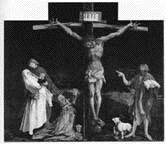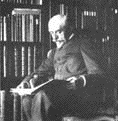



J.-K. Huysmans (1848-1907)
The work of the French novelist and art critic, J.-K. Huysmans, presents a particularly intriguing lens through which to view the cultural and political changes of late nineteenth-century France. One of the reasons for this is that Huysmans’ artistic development offers so many parallels with that of the period itself. As Robert Baldick puts it in his biography of the writer, ’each of [Huysmans’] major works epitomizes some vital phase of the aesthetic, spiritual, or intellectual life of late nineteenth-century France.’
Coming into prominence as a writer during the 1870s, Huysmans quickly established himself among a rising group of writers, the so-called Naturalist school, of whom Zola was the acknowledged head. His debut novel, Marthe: histoire d’une fille (1876), was the first of a number of novels to appear over the next few years by writers of his generation with a prostitute as its central character. Over the next few years Huysmans produced some of the most extreme works in the Naturalist canon: Les Soeurs Vatard (1879), a bleak portrayal of two women working in a book bindery; En Ménage (1881), a bitterly ironic tirade against the bourgeois institution of marriage; and A Vau l’eau (1882) the blackly ironic depiction of a government functionary to whom nothing but the worst happens. But unlike Zola, Huysmans became progressively disillusioned with Naturalism, not as a documentary form, for he wrote with the same attention to detail and employed the same Naturalist techniques whether he was writing about aristocratic decadents or saints of the Middle Ages, but as an existential philosophy of life.
Dissatisfied with the crass materialism and over-simplified reductionism of the Naturalist formula, Huysmans’ work progressively pushed back the boundaries of what constituted the subject of a work of fiction. A Rebours (1884), like Flaubert’s Bouvard et Pechuchet (1881), was a novel without a plot, a compendium or encyclopedia of sensation which reflected (and in some senses invented) the contemporary aesthetics of decadence. In En Rade (1886), the dichotomy in Huysmans’ anomalous position as a Naturalist reached its furthest limit, the book being unequally divided between sections of harsh realism, featuring the grim beastliness of rural life, interspersed with phantasmic dream sequences in which the erotic and the fabulous seem to have free play.
With Là-bas (1891), a novel which reflected the aesthetics of the spiritualist revival and the contemporary interest in the occult, Huysmans formulated for the first time an aesthetic theory which sought to synthesize the mundane and the transcendent: ’spiritual Naturalism’. This new approach carried him through the remaining volumes of his ’spiritual autobiography’, of which En Route (1895) was the first ostensibly pro-Catholic work. La Cathédrale (1898) established Huysmans firmly in the Catholic revival with its extended explorations of the aesthetics of Catholic symbolism.
In his final major works, most notably Sainte Lydwine de Schiedam (1901) and Les Foules de Lourdes (1906), Huysmans dropped the fictional form altogether and embarked on explorations of mystical states of consciousness. In the former, Sainte Lydwine, which is in effect a modern-day hagiography, Huysmans traced the life of the early fifteenth-century mystic and provided a definitive statement of his fervently-held ideas about mystical substitution. In the latter, Huysmans explored the contrast between the mystical visions of Bernadette Soubirous — whose sightings of the Virgin Mary were instrumental in the founding of the shrine at Lourdes — and their crass embodiment by the Catholic hierarchy and the mass of the faithful.
Huysmans died in 1907, after having been diagnosed with cancer of the mouth two years previously. His final years were lived in great pain, but, like the saint whose life he had portrayed a few years before, he refused to take medicine to alleviate it, believing that through his suffering he reduced the pain of others.
Brendan King
